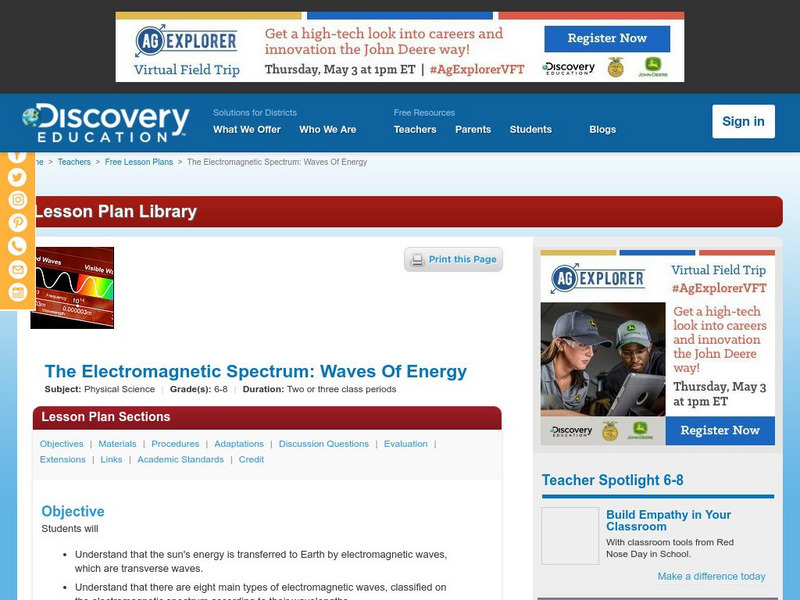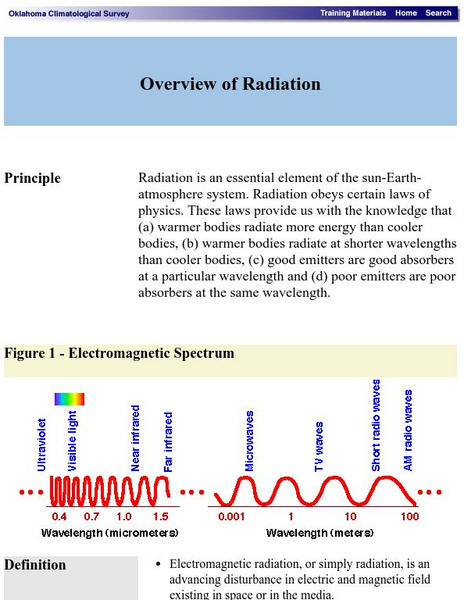Curated OER
Making Sound All Around
Fourth graders examine how sound waves are effected by frequency and pitch. They conduct experiments using tuning forks, rubber bands, balloons, and water, and answer questions about the experiments.
Curated OER
Electromagnetic Spectrum/Spectroscopy
Learners examine the electromagnetic spectrum and demonstrate the elements within. In this investigative lesson students complete a demonstration and calculate the energy of a photon.
Curated OER
Exploring Solar Beads
Students discover solar energy beads and learn about ultraviolet light. For this solar energy lesson, students learn about solar energy beads, ultraviolet light, and UV radiation dangers. Students experiment with the beads to identify.
Curated OER
The Effects of Ultraviolet Light on Lumbriculus
Students explore the effects of ultraviolet light on Lumbriculus. They expose ultraviolet light to Lumbriculus (worm) and determine the lethal exposure time. They examine the worm and record their observations.
Discovery Education
Discovery Education: The Em Spectrum: Waves of Energy
Students are introduced to the electromagnetic spectrum through this group research activity. Each group investigates a different wavelength range within the em spectrum and reports back to class. Discussion ideas also included.
Scholastic
Scholastic: Study Jams! Science: Energy, Light and Sound: Light
A video and a short quiz on the basic concepts and vocabulary for understanding light energy.
Space Telescope Science Institute
Amazing Space: Star Light Star Bright
A few short, interactive activities on light waves can be found on this site. Numerous others links and teacher resources are posted here as well. A good background on light is offered for teachers.
Pennsylvania State University
Kettering University: Vibration & Waves
A short tutorial providing general information about waves, their categories, properties and behaviors. Includes several animations and some practice questions with answers.
Oklahoma Mesonet
Oklahoma Climatological Survey: Overview of Radiation
This site details what radiation is, the physics of radiation, and radiative transfer as it occurs in nature. Content explores the electromagnetic spectrum, electromagnetic waves, properties of radiation, and solar radiation.
Trinity College Dublin
The History of Mathematics: Young
A short sketch of the life and work of Thomas Young (1773-1829 CE). Traces early upbringing and education and his scientific discoveries and contributions.
Cornell University
Cornell University: Astronomy: Electromagnetism and Charge
This site from Cornell University provides a very short, very telling comparison of matter and charge. This is a good site to check out on the subject, with a chart diagram to help with further information.
Curated OER
Cornell University: Electromagnetism and Charge
This site from Cornell University provides a very short, very telling comparison of matter and charge. This is a good site to check out on the subject, with a chart diagram to help with further information.
University of Colorado
University of Colorado: Physics 2000: Balmer's Formula
A short description of a physics lab involving the determination of the wavelength of the four spectral lines in the hydrogen emission spectrum. Perhaps the most important part of the page is the picture of the spectrometer.
Famous Scientists
Famous Scientists: Wilhelm Rontgen
A short biography about the scientist who produced and detected electromagnetic radiation in a wavelength range known as X-rays or Rontgen rays, which earned him the first Nobel Prize in Physics in 1901.











